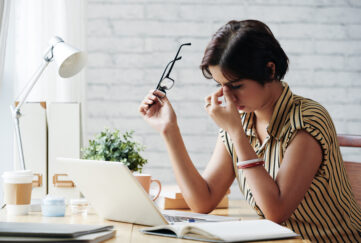Keeping an Eye on Vision

Almost two million Britons suffer with diminished vision but studies suggest it is possible to slow or even prevent damage. According to optometrists, there are many ways to improve eyesight, from vision exercises to a better diet and supplementation.
10 Ways to Look After Your Eyes
1. Remember, what’s good for the body is good for the eyes
Dr Sarah Brewer, GP and medical nutritionist says, “All the usual lifestyle changes help to protect the eyes so if you’re a smoker quit. Smokers are three times more likely to develop cataracts and four times more likely to experience Age-Related Macular Degeneration (AMD) than non–smokers.
2. Traffic light your way to great eye health
Rob Hobson, Healthspan’s Head of Nutrition says, “The National Eye Institute and other vision experts advise that a healthy diet is an important factor in eye health. Researchers have found that certain nutrients with antioxidant properties are beneficial. These include carotenoid compounds such as beta-carotene, lutein and zeaxanthin, and Vitamins C and E. Zinc and Omega-3 fatty acids are also important for eye health. A great tip is to simply ‘traffic light’ your way to great eye health. Greens such as kale are high in lutein and zeaxanthin, which are concentrated in the macula of the eye and help to filter out harmful light that can cause damage. Red and orange foods such as squash and tomatoes are rich in lycopene and beta-carotene that increase the skins defences against UV radiation and also help maintain the health and appearance of skin. Not a substitute for sunscreen, but offers added protection.”
3. Stress and fatigue
Dr Chidi Ngwaba, the UK’s leading lifestyle doctor who specialises in the area of stress says, “It’s important to understand that your eyes do not work in isolation and the visual system is sensitive to stress. Tension and stress can impact on your visual skills and these can show themselves in various ways. These include eyestrain and fatigue, headaches, glasses and contacts never feeling right, difficulty concentrating, watering eyes, sensitivity to light, poor eye-hand coordination and the eye constantly twitching. Sleep is important for eye health as the eyes are replenished with essential nutrients when you sleep. Most importantly, deal with your stress by talking to someone or seeking help and finding ways to help you relax.”
4. The 21st Century tires our eyes
Optometrist Ian White of www.eyevisits.com says, “Nearly 80% of the population are using computers, mobile phones and staring intently at some sort of screen or device for more than three hours a day. This ‘tech age’ has taken a toll on our eyesight.” There are some simple changes you can make such as:
- The 20/20/20 rule: work for 20 minutes then look 20 feet away for 20 seconds.
- Sticking a note on your computer screen to remind you to “blink”. Studies have shown blink rates reduce by up to 70% when concentrating on a computer screen, which leads to dry and uncomfortable eyes.
- Optimising the position of your computer screen to make sure it’s at the correct height and tilted at the right angle for you.
- Keeping it clean – really simple but it’s surprising how many people strain their eyes by looking at dirty, smudged screens or struggle to see through greasy lenses in their glasses.
- Trying to minimise visual glare in your working environment by reducing reflections from fluorescent lighting and having appropriate blinds on nearby windows. For those that wear spectacles, ensure you have an anti-reflective coating on your lenses.”
5. Forties is the eye-eye milestone
Forties is a time when people start to notice changes in their eye health and this really is a key decade to make sure you put eye health as a priority by having yearly check-ups with your optometrist. More specifically, a shift in hormones in your forties can cause dry eyes, according to Dr Sarah Brewer. “In the years leading up to and after menopause, oestrogen and progesterone levels drop, and that is a leading cause of dryness. Prescription eye drops can help to rebuild tears to normal levels. Your diet also plays a key role in lubricating chronic dry eyes and keeping your body well hydrated is also vital.
6. Things we shouldn’t ignore
Everyday living puts our eyes under enormous strain but optometrist Ian White adds, “There are certain signs we should not ignore when it comes to our eyes and some symptoms could hint at a more sinister condition and should be investigated.”
Look out for:
- Occasional floating objects in our vision can be a natural sign of ageing. But when these floaters increase suddenly or occur with flashing lights, this can indicate a retinal detachment which requires you to attend your optician within 24 hours.
- Blurry vision can just mean you need to wear glasses for the first time, but if the vision in one of your eyes deteriorates much more than the other, this can indicate a more serious condition of your eyes or even an underlying brain condition and needs to be looked at further by your optometrist/ophthalmologist.
- Any sort of persistent or intense pain could be a sign of infection and this requires medical attention.
- Red or bloodshot eyes can be caused by many things such as allergies or excess dryness, but if there are any other symptoms such as swelling or pus then you need to see your GP/pharmacist as this could be an infection such as conjunctivitis.
7. A change in the seasons affects our eyes
“Spring and summer can play havoc with our eyes,” says Dr Sarah Brewer. Many people suffer from allergic conjunctivitis which can cause itchy, burning eyes, redness, watering of the eye and puffiness around the eyelids. Seasonal allergic conjunctivitis is normally due to hay fever but perennial allergic conjunctivitis can be caused by dust mites and pets. Dr Brewer advises to aim to avoid known allergens where possible and use anti-histamine eye drops. Chat to your optometrist to see what options are available as, in some cases steroid eye preparations can be prescribed. Cold compresses can offer immediate relief and are available via pharmacies without prescription.
8. Choosing the right eyewear
From regular spectacles to sunglasses, contact lenses and now even “smart” wearable tech eyewear, Optometrist Ian White says, “There’s never been a better time to be a spectacle or contact lens wearer. You have the greatest ever choice to suit personal preferences, lifestyle and budget. With fashion, ease of use and eye health all playing a role in what people choose. Depending on their needs and their mood, many people have multiple pairs of specs and sunglasses that they interchange with contact lens wear on different days. Fashion and trends change every year with bold styles back in vogue and seen as an extension of someone’s personality.”
9. Keep it simple
- All adults should attend the optometrist every two years for a routine check-up, or annually for children and the elderly.
- Always present your optometrist or doctor with any ocular or visual concerns sooner rather than later.
- Upgrade your medicine cabinet with a good eye wash solution and check expiry dates.
- Get the right eye gear – ranging from sunglasses to protect your eyes from harmful UV rays to protective safety eyewear to prevent damage caused by DIY accidents.
10. Can supplementing our diet make a difference to eye health?
Rob Hobson says, “Although diet should always come first supplements are available. We know foods rich in Vitamins C and E, zinc, lutein, zeaxanthin, and Omega-3 fatty acids DHA and EPA are good for eye health and these nutrients are linked to lower risk for age-related macular degeneration (AMD), cataract and dry eye later in life. Supporting our diet with a supplement such as Retinex® Max that contains 20mg of natural lutein and 2,000μg of zeaxanthin sourced from marigolds. Vitamin B2 (riboflavin) also included can play a role in maintaining healthy levels of these nutrients in the eyes.” Healthspan this month launches its new eye care supplement Retinex Max® which has been uniquely formulated by an expert team of nutritionists to help support normal vision. Retinex Max is suitable for Vegans and Vegetarians, 60 tablets £18.45, www.healthspan.co.uk/products/retinex-max
Make 2016 your healthiest year yet!






